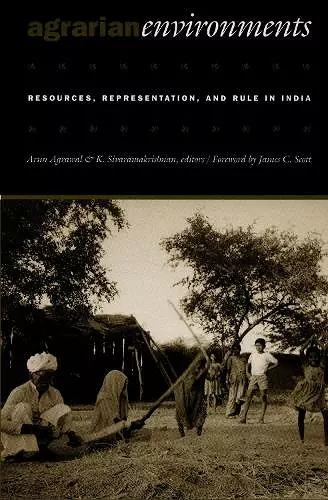Agrarian Environments
Resources, Representations, and Rule in India
K Sivaramakrishnan editor Arun Agrawal editor
Format:Paperback
Publisher:Duke University Press
Currently unavailable, and unfortunately no date known when it will be back

An interdisciplinary exploration of the connections between the politics of environmental degradation and agrarian life in India.
Agrarian Environments questions the dichotomies that have structured earlier analyses of environmental processes in India and offers a new way of looking at the relationship between agrarian transformation and environmental change. The contributors claim that attempts to explain environmental conflicts in terms of the local versus the global, indigenous versus outsiders, women versus men, or the community versus the market or state obscure vital dynamics of mobilization and organization that critically influence thought and policy.
Editors Arun Agrawal and K. Sivaramakrishnan claim that rural social change in India cannot be understood without exploring how environmental changes articulate major aspects of agrarian transformations—technological, cultural, and political—in the last two centuries. In order to examine these issues, they have reached beyond the confines of single disciplinary allegiances or methodological loyalties to bring together anthropologists, historians, political scientists, geographers, and environmental scientists who are significantly informed by interdisciplinary research. Drawing on extensive field and archival research, the contributors demonstrate the powerful political implications of blurring the boundaries between dichotomous cultural representations, combine conceptual analyses with specific case studies, and look at why competing powers chose to emphasize particular representations of land use or social relations. By providing a more textured analysis of how categories emerge and change, this work offers the possibility of creating crucial alliances across populations that have historically been assumed to lack mutual goals.
Agrarian Environments will be valuable to those in political science, Asian studies, and environmental studies.
Contributors. Arun Agrawal, Mark Baker, Molly Chattopadhyaya, Vinay Gidwani, Sumit Guha, Shubhra Gururani, Cecile Jackson, David Ludden, Haripriya Rangan, Paul Robbins, Vasant Saberwal, James C. Scott, K. Sivaramakrishnan, Ajay Skaria, Jennifer Springer, Darren Zook
“[T]he chapters in this book are very cogently argued, and combine to create a coherent whole. They raise important questions, relevant not only to India but also to many other countries in the world.” - Wolfgang Hoeschele, International Politics
“Agrarian Environments makes a pathbreaking theoretical contribution. . . .” - Brian Caton, The Journal of Asian Studies
“[A] stimulating and conceptually sophisticated critique of romanticized populist discourse on indigenous communities, women and environmental/agrarian management. . . . [T]he volume is likely to be of great interest and value to anyone with an interest in South Asian studies, development, environmental issues, gender or community-based resource management.” - Sarah Jewitt, The Journal of Peasant Studies
[E]xtremely rich, both empirically and theoretically. . . . I cannot recommend it highly enough." - Ajantha Subramanian, American Ethnologist
“This fine piece of interdisciplinary work attempts a fundamental reformulation of human-nature relationship. . . . Students of south Asia will find this book extremely rewarding. Given its theoretical profundity, it is a must read for all those having an interest in agrarian-environmental studies.” - Manish K. Thakur, Journal of Development Studies
“Agrarian Environments is a volume of historically and empirically informed essays that represents a new generation of scholarship that promises to reshape the fields of agrarian and environmental studies. By confronting some of the received wisdoms that have separated the study of agriculture from that of the environment, this book opens up a whole range of new and refreshing questions that will be of relevance to scholars and policymakers in all parts of the world.”—Akhil Gupta, author of Postcolonial Developments: Agriculture in the Making of Modern India
“This volume brings a remarkable maturity of vision to the study of the environmental history and politics of India. Departing from the tired nature/culture dichotomy, it offers a fresh approach that situates the environment, agriculture, and politics within a single field. Our understanding of the politics of Indian environment and the academic field of environmental studies will never be the same after Agrarian Environments.”—Gyan Prakash, Princeton University
“Agrarian Environments makes a pathbreaking theoretical contribution. . . .” -- Brian Caton * Journal of Asian Studies *
“[A] stimulating and conceptually sophisticated critique of romanticized populist discourse on indigenous communities, women and environmental/agrarian management. . . . [T]he volume is likely to be of great interest and value to anyone with an interest in South Asian studies, development, environmental issues, gender or community-based resource management.” -- Sarah Jewitt * The Journal of Peasant Studies *
“[T]he chapters in this book are very cogently argued, and combine to create a coherent whole. They raise important questions, relevant not only to India but also to many other countries in the world.” -- Wolfgang Hoeschele * International Politics *
“This fine piece of interdisciplinary work attempts a fundamental reformulation of human-nature relationship. . . . Students of south Asia will find this book extremely rewarding. Given its theoretical profundity, it is a must read for all those having an interest in agrarian-environmental studies.” -- Manish K. Thakur * Journal of Development Studies *
[E]xtremely rich, both empirically and theoretically. . . . I cannot recommend it highly enough." -- Ajantha Subramanian * American Ethnologist *
ISBN: 9780822325741
Dimensions: unknown
Weight: 585g
328 pages